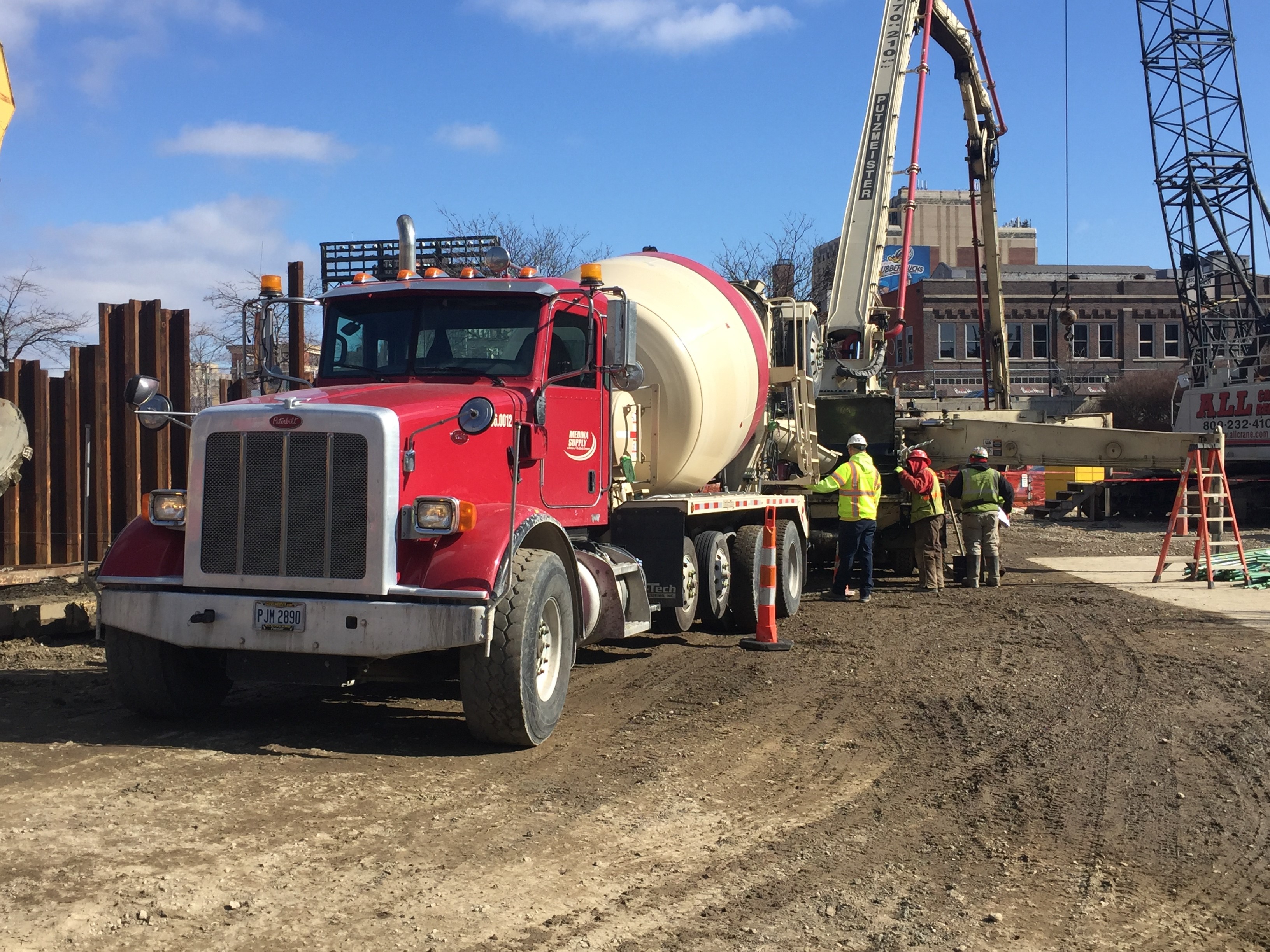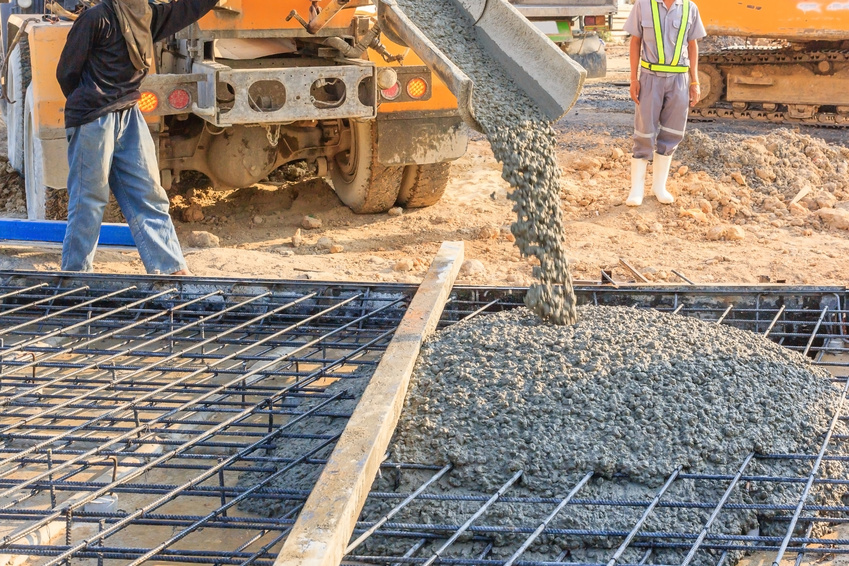The Benefits of Using Concrete Solutions for Long Lasting Frameworks
Concrete services use a series of advantages for building long lasting structures. This product is renowned for its exceptional stamina and durability. Its resistance to ecological variables makes it a useful option for various climates. Additionally, concrete is usually much more affordable in the long run. As designers and builders significantly explore ingenious applications, the capacity of concrete in style becomes a lot more interesting. The conversation of these benefits exposes engaging understandings right into contemporary building methods.

Phenomenal Toughness and Longevity
Concrete is renowned for its outstanding strength and sturdiness, making it a recommended material in building and construction. Concrete Pasadena TX. Its capability to withstand and hold up against heavy lots deformation under stress is unmatched, which is why it is usually utilized for foundational components, sustaining frameworks, and high-rise buildings. The make-up of concrete, which consists of cement, water, and accumulations, enables it to achieve high compressive stamina, typically surpassing that of conventional structure products like wood or steel. This stamina ensures structural stability and durability, thus decreasing upkeep expenses with time. In addition, concrete's sturdiness appears in its capability to endure various tensions without surrendering to damage, making it ideal for diverse applications, from bridges to domestic homes. In general, the robust qualities of concrete contribute to its online reputation as a trustworthy selection for creating enduring frameworks that stand the test of time
Resistance to Environmental Variables
Although numerous building and construction materials are susceptible to ecological wear and tear, concrete exhibits exceptional resistance to various elements such as wetness, temperature variations, and chemical exposure. Its intrinsic properties make it particularly appropriate for diverse applications, from household structures to large infrastructure tasks. Concrete's low permeability limitations water absorption, decreasing the threat of damage from freeze-thaw cycles and preventing mold and mildew growth. Furthermore, it maintains architectural honesty when subjected to severe temperature levels, making it suitable for regions with harsh environments. Concrete additionally stands durable versus chemical attacks, consisting of sulfates and acids, which can break down various other products. This resistance is further boosted by the usage of specialized additives and therapies throughout the mixing procedure. Overall, concrete's toughness in the face of environmental difficulties assurances longevity and reliability, making it a recommended option for designers and contractors aiming to construct withstanding frameworks.
Cost-Effectiveness With Time
Cost-effectiveness in concrete services shows up as a long-lasting financial investment that markedly benefits structures. This approach not just minimizes maintenance expenditures but additionally improves power efficiency, leading to significant savings over time. Comprehending these factors is vital for examining the overall value of sturdy concrete buildings.
Long-Term Investment Advantages
Buying long lasting structures yields substantial long-lasting advantages that extend past initial expenses. Concrete solutions, known for their effectiveness, contribute to a framework's durability, ultimately lowering the complete price of ownership. By making use of top quality products and expert workmanship, proprietors can expect less repair work and replacements gradually. This integrity equates into a steady property worth, making concrete buildings a smart monetary selection in the realty market. Furthermore, frameworks developed with concrete are typically extra energy-efficient, further improving their cost-effectiveness. As a result, the initial financial investment in concrete services can cause significant savings and better returns for many years, verifying the value of picking durable options for lasting building and construction projects.
Lowered Upkeep Expenditures
The durability of concrete frameworks not just boosts asset value but likewise substantially minimizes maintenance expenses in time. Unlike materials that weaken promptly, concrete demonstrates exceptional durability versus various environmental aspects, such as wetness, temperature level variations, and pests. This inherent sturdiness equates to less substitutes and fixings, thus reducing long-lasting prices. Additionally, the low absorption rate of concrete limitations issues connected to mold and mildew and mold, which can demand pricey removal efforts. Routine upkeep is often decreased to simple cleansing instead than substantial fixings, further adding to cost-effectiveness. Therefore, residential or commercial property proprietors purchasing concrete solutions can expect a significant reduction in maintenance spending plans, making concrete an economically sound option for resilient structures.
Energy Efficiency Financial Savings
As energy efficiency ends up being significantly vital in construction, concrete structures stick out for their capacity to boost lasting savings on energy expenses. The thermal mass of concrete enables structures to maintain steady interior temperatures, decreasing the requirement for heating and cooling systems. This property lowers power intake and converts to reduce power costs gradually. Additionally, concrete's toughness adds to less repair services and replacements, additionally enhancing cost-effectiveness. Moreover, contemporary concrete innovations, such as protected concrete types and energy-efficient blends, boost insulation and energy performance, causing considerable check this site out savings. As a result, investing in concrete services not only profits the atmosphere through lowered energy usage yet additionally offers considerable economic advantages for residential or commercial property proprietors in the lengthy run.
Versatility in Design and Application
Concrete's adaptability in design and application permits for a wide range of customizable visual options, making it appropriate for various building styles (Concrete Companies Near Me). Its ability to adjust to diverse architectural applications boosts its functionality in both property and industrial tasks. This versatility positions concrete as a recommended product in modern building and construction
Personalized Aesthetic Choices

Diverse Structural Applications
Discovering the varied structural applications of concrete discloses its impressive versatility in layout and functionality. Concrete is used in numerous forms, consisting of foundations, wall surfaces, pavements, and decorative components, enabling it to adapt to various architectural styles. Its inherent strength and sturdiness make it suitable for skyscrapers, bridges, and facilities jobs. Additionally, concrete can be built into detailed shapes, accommodating cutting-edge designs while keeping architectural stability. This versatility additionally reaches property applications, such as patio areas, driveways, and preserving walls. In addition, innovations in technology have actually brought about the development of specialized concrete blends, enhancing performance in particular atmospheres. This extensive applicability underscores concrete's vital function in modern building, satisfying both useful and visual demands successfully.
Reduced Maintenance Needs
Lots of home owners appreciate the reduced upkeep demands related to concrete frameworks. Unlike products such as timber or steel, concrete is normally immune to pests, rot, and rust. This durability greatly lowers the frequency and expense of repair services in time. Splits and surface wear can be quickly addressed with very little effort, commonly requiring just routine sealing or resurfacing.Additionally, concrete frameworks do not require routine paint or staining, additional contributing to their low maintenance. This characteristic is specifically valuable for business homes, where upkeep expenses can this rapidly accumulate.Furthermore, concrete is much less vulnerable to weather-related damages, guaranteeing that frameworks stay undamaged regardless of ecological problems. Consequently, residential or commercial property owners can appreciate the long-lasting benefits of concrete, including minimized labor and maintenance costs, allowing them to designate sources to various other essential locations of their homes. Ultimately, the reduced upkeep demands of concrete make it an appealing choice for constructing sturdy structures.
Eco-Friendly Building Material
As the demand for sustainable construction practices expands, concrete becomes an environmentally friendly building material that uses many environmental benefits. Its manufacturing can include recycled materials, such as industrial by-products and waste aggregates, which lowers the requirement for virgin sources and lessens land fill waste. In addition, concrete has the capability to manage temperature level, thus improving power efficiency in structures. This thermal mass effect can lead to lower energy usage for heating & cooling, further decreasing a structure's carbon footprint.Moreover, concrete is resilient and long lasting, which suggests structures require less repair services and renovations over time, causing much less source use generally. Developments in modern technology have actually also brought about the growth of low-carbon and environmentally friendly concrete formulations that minimize greenhouse gas discharges throughout manufacturing. By prioritizing concrete in building tasks, building contractors can add to a much more lasting future while ensuring the longevity and strength of frameworks.
Improved Home Worth and Charm
A sound concrete structure notably improves building worth and allure, usually making it extra attractive to potential customers or renters. Concrete's resilience and low upkeep needs add significantly to lasting financial investment returns. Features featuring high-grade concrete buildings often tend to draw in greater deals due to their regarded stability and longevity. In addition, visually pleasing concrete styles, such as stamped or colored finishes, can raise curb charm, creating a positive first impression.Moreover, concrete structures commonly satisfy contemporary structure standards, which can be a marketing point for environmentally aware customers. The energy effectiveness connected with well-insulated concrete additionally interest buyers wanting to minimize energy expenses. On the whole, buying concrete services not only boosts the architectural stability of a residential property but additionally enhances its marketability, resulting in boosted residential property worth and an one-upmanship in the realty market.
Regularly Asked Concerns
The length of time Does It Take to Treat Concrete Correctly?
The healing procedure of concrete usually takes about 28 days to attain suitable toughness, although preliminary setting occurs within hours. Factors like temperature and moisture can influence the treating duration and effectiveness considerably.
What Kinds Of Concrete Services Are Offered?
Various sorts of concrete services exist, consisting of pouring, forming, finishing, resurfacing, and decorative concrete. Concrete Companies Near Me. Companies might additionally provide fixing, reconstruction, and setup of concrete structures, dealing with both property and business demands
Can Concrete Be Recycled After Its Use?
Concrete can undoubtedly be recycled after its use. When refined, it can be repurposed for brand-new construction jobs, reducing waste and promoting sustainability within the building sector while keeping architectural honesty in brand-new applications.
What Are the Best Practices for Pouring Concrete?
When putting concrete, best practices include proper site preparation, ensuring suitable temperature level conditions, using suitable mixing proportions, preserving consistent putting methods, and enabling sufficient treating time to enhance strength and toughness of the ended up framework.
Exist Any Type Of Alternatives to Conventional Concrete?
